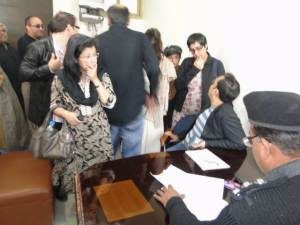Pakistanis Take a Stand and Leverage the Law
 The view that Governor Taseer’s death has spelled the death of free speech and activism, or forced moderates to retreat in the country — this view being particularly announced in the foreign press — is exaggerated and just one side of the picture.
The view that Governor Taseer’s death has spelled the death of free speech and activism, or forced moderates to retreat in the country — this view being particularly announced in the foreign press — is exaggerated and just one side of the picture.
While the governor’s death and the reaction that has followed have instilled fear in the hearts of many, there are still people who refuse to “cower” and let the tyranny prevail. The vigils held the day after Salmaan Taseer’s assassination, as well as the one outside the Governor House in Lahore, are proof of this. Besides, this is not a fight for the survival of liberalism, secularism or the like in the country; it is a struggle for preserving humanity and upholding the law.
A petition prepared by the Citizens For Democracy is to be sent to the Chief Justice of Pakistan, asking him to take suo moto action against vigilantism and incitement to violence (read and endorse the petition here). It makes reference to “the imam of the Mohabbat Khan mosque in Peshawar” who had announced a reward for the murder of Aasia Noreen, aka Aasiya Bibi, if the Lahore High Court acquitted her. The request states: “Given the religious sensitivities surrounding the issue at the heart of the matter, this matter can be reasonably taken up only by the esteemed Supreme Court of Pakistan to finally and conclusively determine the criminality in inciting murder in the midst of hysteria around allegations of blasphemy.”
The qari’s example raises several other questions: While offering head money is a crime itself (a criminal offence punishable by law), what about the cleric’s unveiled attempt at influencing court proceedings, or making it crystal clear that only a certain type of verdict would be acceptable, obviously deriding the authority of the courts. Does that not call for contempt of court? Also, does the amount offered by the cleric not raise eyebrows within the National Accountability Bureau? How and from where is this cleric accessing such huge amounts of money?
The exploitation of the common man and negligence by government officials, courts and law enforcers has pushed him into justifying high-profile killings such as Salmaan Taseer’s, even though he may not be religiously inclined to condone it. So sick is he of the rampant corruption amongst officials and institutions, that he now thinks the bumping off of any politician, bureaucrat of government office bearer makes one less in the band of many, and his response is simply ‘good riddance.’
What is being argued right now is that no person has the right nor should be allowed to call another a non-Muslim, incite others to kill and escape punishment by justifying murder on religious grounds. Although it is directly the duty of the government, courts and law-enforcers to take cognisance and action, in the absence of that happening, civil society is stepping in to remind the relevant authorities of their responsibility and requesting them to kindly uphold the law.
This is why it was members of civil society in Karachi who took it upon themselves to file an application for an FIR against the Sultan Masjid cleric Munir Ahmed Shakir for saying in his Friday prayers sermon that anybody who commits blasphemy will meet the same fate as Salmaan Taseer. The constant refrain — that anyone who speaks about changes in this law (be they procedural, for example, suggesting a magistrate and not a policeman should be allowed to take cognisance of such cases) is not a Muslim and has committed blasphemy — under the current circumstances, could very well lead to more killings on religious grounds and their justifications. The cleric’s case is currently being investigated by the Darakhshan police, while he himself has denied charges levelled against him.
It is heartening to see that PEMRA has followed suit and has finally come out and taken a stand by issuing a fine Samaa and Waqt for airing Qadri’s interview, in which he stated why he killed Taseer. It can be argued that it is this interview that helped generate support for the killer. According to the PEMRA notification, the authority also intends to place a ban on talk shows discussing sub judice matters.
The prime minister was quoted as saying, “It was the collective obligation of media to make efforts against extremism and not highlight the ideology and activities of extremists.” Sure, the media must account for its excessive coverage of one point of view, but the fact remains that this happened also because few government officials came forward to state otherwise.
Had any of this been said and done earlier, a lot of damage could have been prevented, and a life, too, may have been saved.
Letter of Incitement
In this widely distributed pamphlet, in which the term “na paak” is used frequently, it says, “PPP, through its MNA Sherry Rehman, has presented a bill to amend the Blasphemy Law (Qanoon Tahafuz-e-Namoos-e-Risalat) and a committee has been formed for this (‘na paak‘) purpose under the Minister for Minorities.” It clearly states that everybody must come out to protest against the amendment or repeal of this law.
This handout also doubled as an invitation for the January 9 march in support of the blasphemy law held in Karachi that drew approximately 40,000 people.
Farieha Aziz is a Karachi-based journalist and teacher. She joined Newsline in 2007, rising to assistant editor. Farieha was awarded the APNS award for Best Investigative Report (Business/Economic) for the year 2007-2008. She is a co-founder and Director at Bolo Bhi, an advocacy forum of Digital Rights.



